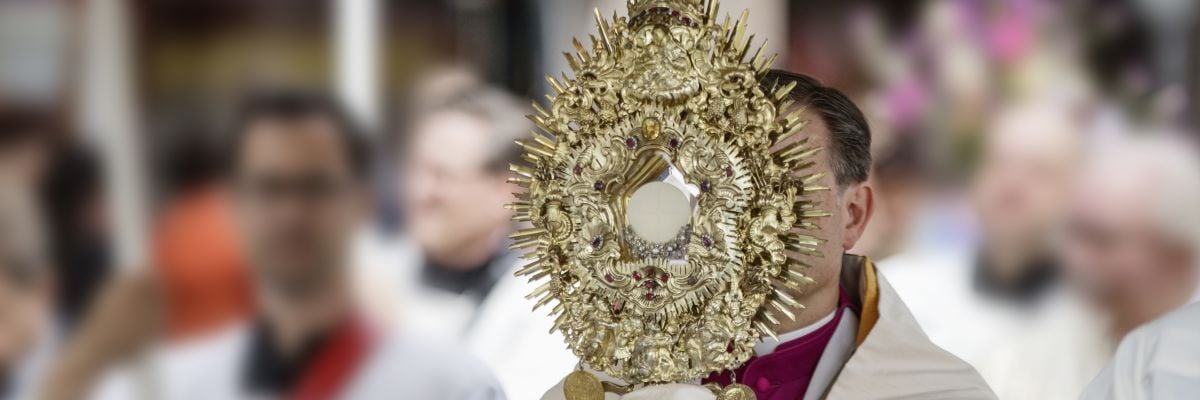
A recent Pew Poll revealed that less than one-third of U.S. Catholics believe in transubstantiation—that the bread and wine used in the holy sacrifice of the Mass are changed into the actual body, blood, soul, and divinity of Jesus Christ through the ministry of the officiating priest. Among the troubling findings of the poll was a sliver of hope, however: 63 percent of Catholics who attend Mass at least once per week do believe in the Real Presence.
Like I said, a sliver. To be honest, I would have predicted a lower number overall. The poll included large numbers of Catholics who no longer attend Mass, which skewed the results to a certain degree.
Still, this poll reveals a grave problem that demands the Church’s immediate and full attention.
I am encouraged to see so many leaders, both Catholic and non-Catholic, shouting the findings of this Pew poll from their digital rooftops! Fewer people are talking, however, about what is perhaps even more disturbing. At Catholic Answers we hear about an alarming number of priests who by their actions or teaching cause confusion about Christ’s real presence in the Eucharist. They do not so much deny this truth outright as effectively reduce its truth to the point of incoherence or distortion.
If we want to get to what really causes the loss of belief revealed in these poll numbers, this may well be a good place to start. We speak a great deal about the stripping of our Catholic churches and liturgies of the beauty essential to communicate the reality of the great mystery of the Eucharist to the faithful. As well we should. But perhaps this, too, is a different symptom of the same root cause.
Take the case of Jesuit Fr. Thomas Reese, who, among other unsettling things, who in the National Catholic Reporter recently wrote of how the definition of the Eucharist as the “substantial” presence of Christ under the “accidents” (appearances) of bread and wine is a relic of the thirteenth century to be abandoned. Reese shockingly confesses, “I do not believe in prime matter, substantial forms, substance and accidents.”
It is disturbing to see a priest dismiss the undergirding principles of Church teaching. The Council of Trent defined infallibly that:
If anyone… denieth that wonderful and singular conversion of the whole substance of the bread into the Body, and of the whole substance of the wine into the Blood—the species Only of the bread and wine remaining—which conversion indeed the Catholic Church most aptly calls transubstantiation; let him be anathema.
To suggest we should jettison the very ideas of “substance” and “accidents” is to gut the definition. But Fr. Reese does more than just reject these “Aristotelian concepts.” He calls maintaining this doctrine “a fool’s errand” because he finds “the theology of transubstantiation unintelligible.” His words make me wonder whether I am reading a note from a Catholic priest or a college freshman convinced he is the center of the universe:
I personally find the theology of transubstantiation unintelligible, not because I don’t believe that the bread and wine become the body and blood of Christ, but because I do not believe in prime matter, substantial forms, substance and accidents. I don’t think we have a clue what Jesus meant when he said, “This is my body.” I think we should humbly accept it as a mystery and not pretend we understand it.
Fr. Reese somehow seems to think that a magisterial definition concerning a mystery ipso facto means the Church claims to exhaust the mystery. Yet the Church has never claimed and can never claim this. As The Catechism of the Catholic Church says so well, “Our limited language cannot exhaust the mystery (48).” No one is pretending we understand the mystery completely.
But this doesn’t mean we haven’t “a clue what Jesus meant” by “this is my body,” either. This smacks of a kind of fideism that renders the Faith incoherent—and thus irrelevant.
It can’t be explained anyway, so why talk about it? You either have the faith or you don’t. This is closer to Karl Barth than to Catholicism.
Fr. Reese seems to have lost the balance between the ineffability of the mystery in and of itself and the many “clues” that God gives us through the Church so that we can begin to understand the mystery “in a mirror dimly.” St. Paul continues, “Now I know in part; then I shall understand fully” (1 Cor. 13:12).
The Catechism reflects, concerning the mystery of God himself:
In speaking about God like this, our language is using human modes of expression; nevertheless, it really does attain to God himself, though unable to express him in his infinite simplicity (43).
In defending the ability of human reason to know God, the Church is expressing her confidence in the possibility of speaking about him [and all of the mysteries of the Faith] to all men and with all men, and therefore of dialogue with other religions, with philosophy and science, as well as with unbelievers and atheists (39).
I was struck by the number of first-person personal pronouns and singular verbs Fr. Reese uses in his article. “I personally find…” “I do not believe…” “I don’t think…” “I think we should…” It was really not a surprise, then, when he went on to claim, “The Mass is more about us becoming the body of Christ than it is about the bread becoming the body of Christ.” By setting up this false dichotomy, the “I” or “us” becomes more important than the “thou” or “him.”
Let’s see. According to the teaching of the Church, the Mass is a “sacrifice of praise” to God, not to us; “thanksgiving” to God, not to us; “satisfaction” to God, not to us; and “petition” to God, not to us (CCC 1361, 1360, 1367; cf. 616, 2838). The Mass is more about whom?
It doesn’t stop here. Reese goes on to say, “The Mass is not about adoring Jesus or even praying to Jesus.” Really? Then what is the priest doing when he genuflects after each of the distinct prayers of consecration over the two species of bread and wine during the institution narrative? And what are we to do in our prayer after Communion? Should we ignore the fact that the Second Person of the Blessed Trinity is really, truly, substantially present in our bodies? And are we to do what the Catechism teaches?
In the liturgy of the Mass we express our faith in the real presence of Christ under the species of bread and wine by, among other ways, genuflecting or bowing deeply as a sign of adoration of the Lord. “The Catholic Church has always offered and still offers to the sacrament of the Eucharist the cult of adoration, not only during Mass, but also outside of it” (1378).
The Pew Research poll is disturbing. The errors presented as Catholic eucharistic theology even by well-known priests may be more disturbing, since they lead more Catholics to lose faith in the Real Presence. But the task to correct those errors, though daunting, is not beyond our ability. It is part of the “new evangelization” to which Pope St. John Paul II called us: the work of evangelizing those already in the Church. And the stakes are high. As Lumen Gentium (14) says, Catholics who do not live their faith authentically risk losing their souls:
He is not saved who, though part of the body of the Church, does not persevere in charity. He remains indeed in the bosom of the Church, but, as it were, only in a “bodily” manner and not “in his heart.” All the Church’s children should remember that their exalted status is to be attributed not to their own merits but to the special grace of Christ. If they fail moreover to respond to that grace in thought, word, and deed, not only shall they not be saved but they will be the more severely judged.



